Why don't we li
- 格式:pptx
- 大小:452.78 KB
- 文档页数:10

最新一般现在时知识点(大全)经典1一、一般现在时1.—Why don't we to the beach tomorrow?—Good idea!A. goB. to goC. goingD. went【答案】A【解析】【分析】句意:我们明天为什么不去海边呢?固定句型搭配Why don't…do此处是动词原形。
故A选项正确。
【点评】考查Why don't句型。
2.She _____ out alone at night.A. dare not to goB. dares not goC. doesn't dare to goD. doesn't dares go【答案】 C【解析】【分析】句意:晚上她不敢一个人出去。
dare可以作情态动词也可以作行为动词,作情态动词时,后面直接跟动词原形,没有人称与数的变化,构成否定时直接在dare 后加not,作行为动词时后跟动词不定式,构成否定需要助动词,故答案是C。
【点评】考查dare的用法,注意dare做情态动词和行为动词的用法上的区别。
3.Not only Li Ming but also his parents ______ in Canada now.A. isB. areC. wasD. were【答案】 B【解析】【分析】句意:现在不仅李明,而且他的父母也在加拿大。
根据now,可知时态是一般现在时,主语是his parents,复数,故用be动词用are,故选B。
【点评】考查动词辨析,注意be动词are的用法。
4.I don't know if he tomorrow. If he , I'll call you at once.A. comes, comesB. will come; comesC. will come, will come【答案】 B【解析】【分析】句意:我不知道他明天是否回来。
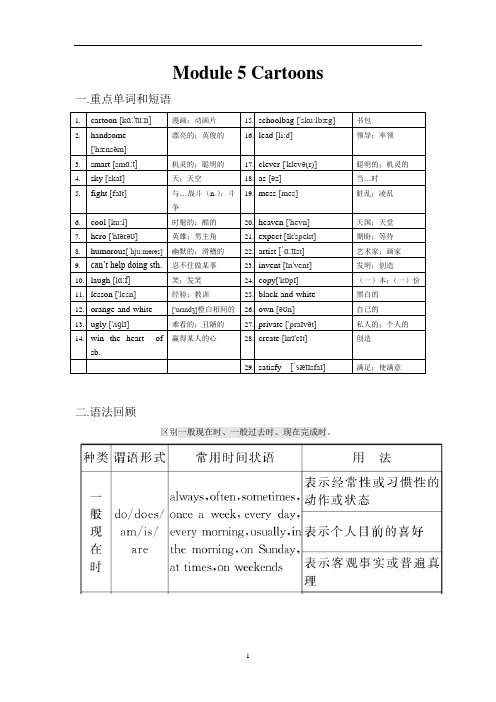
Module 5 Cartoons一.重点单词和短语1.cartoon [kɑ:'tu:n]漫画;动画片15.schoolbag ['sku:lbæg]书包漂亮的;英俊的16.lead [li:d]领导;率领2.handsome['hænsəm]3.smart [smɑ:t]机灵的;聪明的17.clever ['klevə(r)]聪明的;机灵的4.sky [skaɪ]天;天空18.as [əz]当…时5.fight [faɪt]与…战斗(n.);斗19.mess [mes]脏乱;凌乱争6.cool [ku:l]时髦的;酷的20.heaven ['hevn]天国;天堂7.hero ['hɪərəʊ]英雄;男主角21.expect [ɪk'spekt]期盼;等待8.humorous[ˈhju:mərəs]幽默的;滑稽的22.artist[ˈɑ:tɪst]艺术家;画家9.can’t help doing sth.忍不住做某事23.invent [ɪn'vent]发明;创造ugh [lɑ:f]笑;发笑24.copy['kɒpɪ](一)本;(一)份11.lesson ['lesn]经验;教训25.black-and-white 黑白的12.orange-and-white ['ɒrɪndʒ]橙白相间的26.own [əʊn]自己的13.ugly ['ʌɡlɪ]难看的;丑陋的27.private ['praɪvət]私人的;个人的14.win the heart of赢得某人的心28.create [krɪ'eɪt]创造sb.29.satisfy[ˈsætɪsfaɪ]满足;使满意二.语法回顾区别一般现在时、一般过去时、现在完成时。
三.语法操练一、根据句意用所给词的适当形式填空。
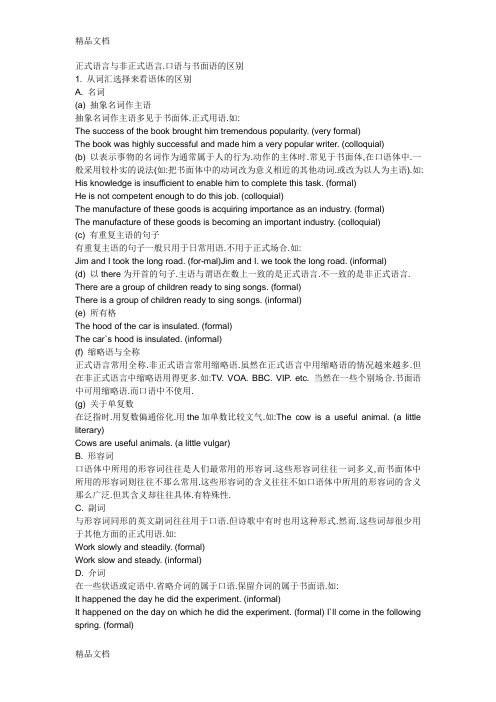
正式语言与非正式语言.口语与书面语的区别1. 从词汇选择来看语体的区别A. 名词(a) 抽象名词作主语抽象名词作主语多见于书面体.正式用语.如:The success of the book brought him tremendous popularity. (very formal)The book was highly successful and made him a very popular writer. (colloquial)(b) 以表示事物的名词作为通常属于人的行为.动作的主体时.常见于书面体,在口语体中.一般采用较朴实的说法(如:把书面体中的动词改为意义相近的其他动词.或改为以人为主语).如: His knowledge is insufficient to enable him to complete this task. (formal)He is not competent enough to do this job. (colloquial)The manufacture of these goods is acquiring importance as an industry. (formal)The manufacture of these goods is becoming an important industry. (colloquial)(c) 有重复主语的句子有重复主语的句子一般只用于日常用语.不用于正式场合.如:Jim and I took the long road. (for-mal)Jim and I. we took the long road. (informal)(d) 以there为开首的句子.主语与谓语在数上一致的是正式语言.不一致的是非正式语言. There are a group of children ready to sing songs. (formal)There is a group of children ready to sing songs. (informal)(e) 所有格The hood of the car is insulated. (formal)The car`s hood is insulated. (informal)(f) 缩略语与全称正式语言常用全称.非正式语言常用缩略语.虽然在正式语言中用缩略语的情况越来越多.但在非正式语言中缩略语用得更多.如:TV. VOA. BBC. VIP. etc. 当然在一些个别场合.书面语中可用缩略语.而口语中不使用.(g) 关于单复数在泛指时.用复数偏通俗化.用the加单数比较文气.如:The cow is a useful animal. (a little literary)Cows are useful animals. (a little vulgar)B. 形容词口语体中所用的形容词往往是人们最常用的形容词.这些形容词往往一词多义,而书面体中所用的形容词则往往不那么常用.这些形容词的含义往往不如口语体中所用的形容词的含义那么广泛.但其含义却往往具体.有特殊性.C. 副词与形容词同形的英文副词往往用于口语.但诗歌中有时也用这种形式.然而.这些词却很少用于其他方面的正式用语.如:Work slowly and steadily. (formal)Work slow and steady. (informal)D. 介词在一些状语或定语中.省略介词的属于口语.保留介词的属于书面语.如:It happened the day he did the experiment. (informal)It happened on the day on which he did the experiment. (formal) I`ll come in the following spring. (formal)I`ll come the following spring. (colloquialE. 代词(a) 口语中多省略作主语的代词.如:Haven`t seen you for ages! (informal)(b) 关于mine. his. yours. Ours当mine. his. yours. ours等物主代词作宾语或表语时.可用于书面语.也可用于口语.但如果这种物主代词(或名词所有格)作主语放在句首.并暗指表语名词所用的概念.那就是一种比较文雅的说法了.如:His (or Mr. Li`s) is a noble character.在日常口语中一般这么用:His (or Mr. Li`s) character is a noble one. / He has a noble character.但下面这类句子对书面语和口语都适用:Your teacher and mine are talking in the room.(c) we. I在一些正式场合.作者或演讲人为了表示谦虚.往往避免用I.而用we代替.如:As we showed a moment ago ... (formal)As I said a moment ago ... (not so formal)(d) you. we用we代替you是一种表示客气的语言.如:Don`t worry about your shoes! (imperative)Why don`t we not worry about your shoes. OK ? (polite)(e) you. one在翻译中文"任何人"."谁都"等时.译成one为formal language.译成you为informal language.如:One must love one`s country. (formal)You must love your country. (informal)(f) 关于I. me. he. him. etc.He says she saw you and me. (formal)He says she saw you and I. (informal)F. 动名词在书面语中.一般用物主代词或名词所有格来修饰动名词短语.以表示行为者.如:Mr. Li dislikes Zhang Hui`s coming home late.There will be little chance of my visiting the place again.Li Wen`s falling ill suddenly gave me a surprise.口语中一般以代词的宾格或名词普通格加分词.for加宾语加不定式.从句.独立句等方式表达.如:Mr. Li dislikes Zhang Hui coming home late.There will be little chance for me to visit the place again.Li Wen fell ill suddenly. This gave me a surprise.G. 关于缩写用缩写形式多为非正式语言.而用非缩写形式多为正式语言.如:do not. we are. I am. I have. there is. cannot. will not等多见于正式语言.而don`t. we`re. I`m. I`ve. there`s. can`t. won`t 多见于非正式语言.exam. bike等多用于口语.examination. bicycle等多用于书面语.oh. dear. why. well等是口语中常见的感叹词.2. 从句法来看语体的区别A. 修饰语在书面文字中.修饰语可以与中心词相隔较远.修饰语也可以较长.而在口语中则相反.如: There exist complex computations in science and engineering which people are unable to make. (written)There are complex computations in science and engineering. and people are unable to make those computations. (colloquial)B. 句子的长短一般来说.书面语句子较长.口语句子较短.(a) 议论文.商业或法律公文等书面语不仅常用较长的修饰语.而且有时用较长的插入语.甚至插入语中还有插入语.但在一般的口语中则不用较长的插入语.常用的较短插入语有:of course. for example. I believe. I think. you see. you know. to be frank. etc.(b) 在书面语中.一个句子有时有好几个关系代词,而口语中关系代词则用的极少.往往被分成几个简单句.如:These needles. which were made of fish-shaped pieces of iron that floated on water. were acted on by the earth`s magnetic field. (formal)These needles were made of fish-shaped pieces of iron that floated on water. They were acted on by the earth`s magnetic field. (informal)C. 关于时态在现在的口语中.有时用过去时代替现在完成时.如:-Is anybody using this chair?-No. I saved it for you.在口语中常用现在时代替将来时.如:She is coming tomorrow.在口语中有时用一般现在时说明一个已经发生了的动作.如:He says it is very important.D. 虚拟语气(a)不够熟悉的人之间对话.或在正式场合演讲.对话时.一般用虚拟语气来陈述自己的看法.提出请求或邀请.提出建议或劝告.提出问题.如:If Mr. Wang was here now. he would tell you about it. (informal)If Mr. Wang were here now. he would tell you about it. (formal)(b) 有一些表示主观愿望和情绪的形容词.如desirous等要求后面的状语从句的谓语动词用虚拟语气.这种结构主要用于书面语中.口语中往往用不定式来代替这种从句.如:He was anxious that we should stay for dinner. (formal)He was anxious to have us stay for dinner. (informal)E. 语序在书面语中.为了使句子平衡对称.或为了表示强调.常把状语.表语.宾语等成分放在句首.并将主谓次序颠倒过来,而口语体则一般用自然语序.F. 关于省略(a) 在正式文字或正式场合的对话中.一般要用完整的句子.在口语中用省略句较多.主要是为了节省时间.使对话自然.生动.简洁.有力.如:Where to go now? Why not do it this way?(b) 在正式语言中.所省略的部分一般都是前边出现过的.如:He had finished the work and gone home.(c) 关系代词在限定性定语从句中做谓语动词宾语或介词宾语时.在口语中一般省去.如: The girl you spoke to just now is my sister.(d) 宾语从句前的that在口语中往往省去.表语后面的从句之前的that在口语中也常省去.如: He said he would go to London.I`m afraid he is right.G. 主谓语的一致性在有些情况下.非正式语言中常按意思决定动词的单复数.所以主语和谓语在数上可能不一致.如:Neither he nor his wife have arrived. (informal)Neither he nor his wife has arrived. (formal)(David Park designs & teaches IELTS courses for individuals & groups. He was contracted by the British Council to provide this article.)A student preparing for IELTS (International English Language Testing System) sent me this query: “I don’t know if ‘spark off’ is a f ormal word or not. How can I tell the difference between formal and informal words?” Here’s what I said to her in my reply:English has three main styles: formal, informal and popular.Formal EnglishFormal English is mainly used in writing. This style is academic in tone and is commonly used in academic textbooks, most university essays, business letters and contracts.In the case of speaking, formal English is usually only used for official or serious occasions, e.g., to formally welcome guests at a university graduation ceremony.Formal English uses more complex vocabulary than everyday speech. For example, it uses many “bigger” words that aren’t normally used in conversation. Examples are multi-syllable words like compensate, ascend and interrogate. It also prefers one-part verbs (e.g., establish) instead of simpler, phrasal verbs (e.g., set up). Slang and colloquial vocabulary are avoided.When formal English is used in writing, sentences tend to be long and complex, and grammar rules are followed strictly. It tends to be impersonal (or neutral), often using impersonal pronouns like it and passive verbs. Contracted and abbreviated forms of words are usually avoided.Informal & popular EnglishInformal English is the language spoken by most people every day. It’s also widely used in emails and letters to friends.Speakers of informal English aren’t very concerned about their vocabulary. For example, informal English uses many short words (e.g., fire, climb and ask), much colloquial vocabulary (e.g., stuff, a lot of, thing and sort of) and multi-part verbs (e.g., set up instead of establish). Informal English is also more relaxed about grammar rules than formal English, using simpler grammatical structures and loosely-connected sentences and phrases.When used in writing, informal English uses first and second person points-of-view (e.g., I, you and we) to create a more personal style than formal English. Contractions (e.g., it’s instead of it is)are also very common. As well, informal English tends to use shorter sentences than in more formal writing, and the more formal punctuation marks − the semi-colon (;) and colon (:) − are usually avoided.Popular English is rarely used in writing, being used mostly in spoken English. It includes a good bit of slang. Slang is words or expressions that are very informal and are not considered suitable for polite speech or more formal situations. Slang is often used only by particular social groups or professions.More on phrasal verbsWhen people speak or write informally, they often use phrasal verbs (also called multi-word or multi-part verbs). Here are some examples. The formal, one-word verb with the same meaning is in brackets.Phrasal verbs & single-word equivalentsask for (request) go down with (contract)set up (establish) deal with (handle)find out (discover) take in (deceive)Phrasal verbs are very common in spoken English. However, they’re usually less formal than their one-word verb equivalents.In formal writing, writers often prefer to use single-word verbs, such as examine or devise, rather than phrasal verbs, such as look at or come up with. Compare the pairs of verbs in the next table.Though there’s a tendency to use fewer phrasal verbs in formal language, it’s n ot wrong to use them. Nevertheless, if there’s a one-word verb that’s more formal, then use it.Don’t think that a few phrasal verbs in your IELTS writing will make it too informal. In fact, there are many situations - even in quite formal texts - when a phrasal verb is the most natural-sounding way of expressing an idea. For instance, put on is much more natural than the formal, single-word equivalent don.InformalMore formalHe checked up on his accountant. He investigated his accountant.They put up with their neighbours. They tolerated their neighbours.She caught on very quickly. She understood very quickly.She made up for it with an early night. She compensated for it with an early night.He went down with a fever. He contracted a fever.The cost of living went up. The cost of living increased/rose.Telling the differenceIt’s usually easy to decide if a word is informal or formal. Informal words are those common, ordinary and familiar words that people use every day, whereas formal words tend to be the more “serious” and less frequently used words. Often, formal words are longer than informal words. Single-word verbs are also usually more formal than their phrasal verb equivalents.For instance, saying something is enormous is f ormal, but saying it’s whopping is informal. Phrases like on the one hand or as indicated above are formal, but phrases like by the way or that reminds me are informal. Note that some informal words are more formal than other informal words. The informal verb understand, for example, is more formal than the informal verb get. However, both are less formal than the formal verb comprehend.IELTS uses a semi-formal styleThe IELTS website says academic essays may use “a neutral or slightly formal style of writing.”This means your IELTS academic writing may use slightly less formal vocabulary (e.g., phrasal verbs like spark off instead of cause) as well as words that are more formal. It may also use the complex grammar of formal English, or it may use slightly simpler grammatical structures.However, the more formal the vocabulary and the more complex the grammar is, the higher the IELTS score. In the case of vocabulary, for instance, the scoring scheme gives higher scores when “less common” or “uncommon lexical items” (words or phrases) are used − which is what formal vocabulary is. Click here to see the scoring scheme.Here’s my advice for vocabulary for academic essays in the IELTS exam:Use a more formal one-word verb if it sounds more appropriate than its phrasal verb equivalent. Avoid using a personal or conversational style (as if you’re talking to the examiner). Therefore, try not to use words like I, me, my, you, we, us and our. Though these words are widely used in informal writing and in spo ken English, they’re generally thought to be too personal and too casual for formal, academic writing.If you wish, you may use the pronoun I to introduce your opinions. However, I recommend that you limit its use to the introduction and the closing parag raph. That way, you’ll avoid the risk of making your essay sound too conversational or overly personal.Avoid words or phrases used mainly in normal conversation as they’re usually not suitable for usein academic writing. Dictionaries often identify the se words with the label “informal.” In your essay, use a more formal equivalent. Here are some examples:Avoid Usekids childrenOK all right; acceptablea lot of much; manyheaps many; a great dealNever use colloquial English or slang. Colloquial English is a type of informal English, and it includes words such as gonna or wanna, and phrases such as ain’t nothin’ and dead as a doornail. Dictionaries usually mark colloquial words and phrases with a label like “colloq.” Because colloquial English and slang are usually spoken rather than written, they’ll make your academic writing sound too conversational and so less credible.Although it’s usual to contract words in spoken and informal written English (e.g., can’t, won’t, shouldn’t and hasn’t), it’s better to avoid using any contractions in your academic essay.Avoid abbreviating words in academic writing. Don’t say yrs, e.g. (which stands for the original Latin exempli gratia and means “for example”) or i.e. (which stands for the original Latin id est and means “that is”). Instead, write the words in full using their English equivalents (years, for example and that is).Glossaryslang (noun) - informal language that is usually spoken and used especially by certain groups of peoplecolloquial (adjective) - words or expressions that are informal and more suitable for use in speechcontract (verb) - to shorten somethingtendency (noun) - a likelihood to do somethingDiscussionWhat are the three main styles of English? Which style should you use for your IELTS academic writing? Why?Apart from using many short words in informal English, what other differences can you point out between informal and formal English?Have you checked the scoring scheme for the writing test? How will you evaulate your own writing in the areas of lexical resource and grammatical range and accuracy?After reading this article, can you compile a list of words or phrases that should not be used whenwriting your IELTS academic essay?DownloadsPlease right click on the title and select 'Save Target As...' from the menu to save the file to your computer.。
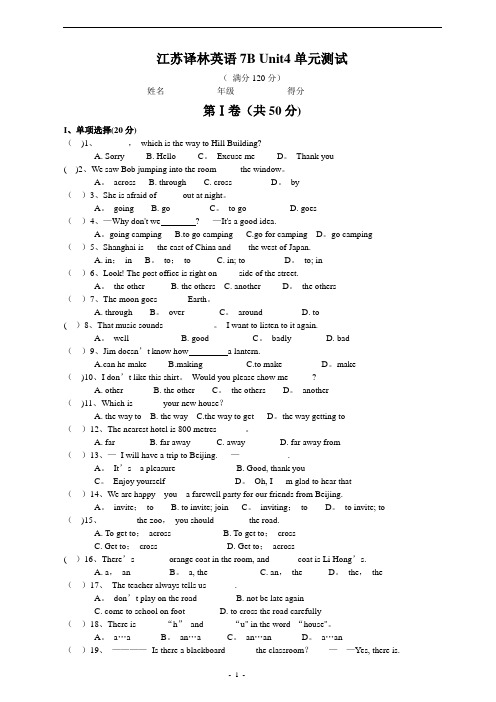
江苏译林英语7B Unit4单元测试(满分120分)姓名____________年级____________得分____________第Ⅰ卷(共50分)I、单项选择(20分)()1、_____ ,which is the way to Hill Building?A. SorryB. Hello C。
Excuse me D。
Thank you( )2、We saw Bob jumping into the room_____ the window。
A。
across B. through C. cross D。
by()3、She is afraid of _____ out at night。
A。
going B. go C。
to go D. goes()4、—Why don't we ? —It's a good idea.A。
going camping B.to go camping C.go for camping D。
go camping()5、Shanghai is __ the east of China and ___ the west of Japan.A. in;in B。
to;to C. in; to D。
to; in()6、Look! The post office is right on ____ side of the street.A。
the other B. the others C. another D。
the others()7、The moon goes ______ Earth。
A. through B。
over C。
around D. to( )8、That music sounds __________ 。
I want to listen to it again.A。
well B. good C。
badly D. bad()9、Jim doesn’t know how a lantern.A.can he makeB.makingC.to make D。
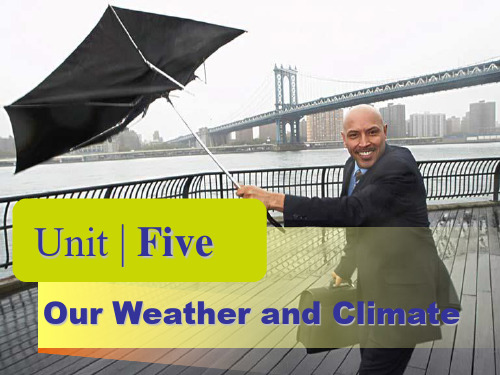
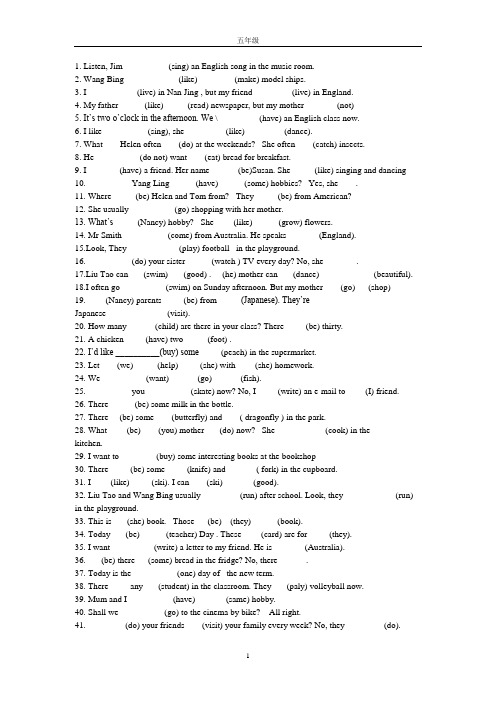
1. Listen, Jim __________(sing) an English song in the music room.2. Wang Bing ____________(like)________ (make) model ships.3. I ___________(live) in Nan Jing , but my friend ________ (live) in England.4. My father (like) (read) newspaper, but my mother_______ (not)5. It’s two o’clock in the afternoon. We \_________ (have) an English class now.6. I like __________(sing), she _________(like)_________(dance).7. What Helen often (do) at the weekends? She often (catch) insects.8. He __________(do not) want (eat) bread for breakfast.9. I _______(have) a friend. Her name ______(be)Susan. She _____(like) singing and dancing10. __________Yang Ling (have) (some) hobbies? Yes, she .11. Where (be) Helen and Tom from? They_____ (be) from American?12. She usually __________(go) shopping with her mother.13. What’s(Nancy) hobby? She (like) (grow) flowers.14. Mr Smith __________(come) from Australia. He speaks (England).15.Look, They __________ (play) football in the playground.16. __________(do) your sister (watch ) TV every day? No, she .17.Liu Tao can (swim) (good) . (he) mother can (dance) _________(beautiful).18.I often go __________(swim) on Sunday afternoon. But my mother (go) (shop)19. (Nancy) parents (be) from (Japanese). They’reJapanese _________(visit).20. How many (child) are there in your class? There (be) thirty.21. A chicken (have) two (foot) .22. I’d like __________(buy) some(peach) in the supermarket.23. Let (we) (help) (she) with (she) homework.24. We __________(want) (go) (fish).25.__________ you __________(skate) now? No, I (write) an e-mail to (I) friend.26. There (be) some milk in the bottle.27. There (be) some (butterfly) and ( dragonfly ) in the park.28. What (be) (you) mother (do) now? She ________(cook) in the kitchen.29. I want to ________(buy) some interesting books at the bookshop30. There (be) some (knife) and ( fork) in the cupboard.31. I (like) (ski). I can (ski) (good).32. Liu Tao and Wang Bing usually ________ (run) after school. Look, they ________(run) in the playground.33. This is (she) book. Those (be) (they) (book).34. Today (be) (teacher) Day . These (card) are for (they).35. I want__________(write) a letter to my friend. He is (Australia).36. (be) there (some) bread in the fridge? No, there .37. Today is the __________(one) day of the new term.38. There any (student) in the classroom. They (paly) volleyball now.39. Mum and I __________(have) (same) hobby.40. Shall we __________(go) to the cinema by bike? All right.41. ________ (do) your friends (visit) your family every week? No, they_________(do).42. What _(be) one plus four? It’s five.43. show (they) how (darw) firefly)44. Who (be) on duty today?45. Don’t play the violin. Your father __________(sleep) in the bedroom.练习(2)1. He usually________(go) _________(shop) after lunch.2. He _________(have) a family.3. My aunt often_________(play) table tennis after school.4. _________(do)she_________ (feel) tried?5. His brothers ______ (surf) the Internet every day.6. He_________ (not do) ___________(he) housework at the weekends.7. The_______ (child) are _________ (talk) about their weekends.8. My mother_________ (like)________(dance).She can_____ (dance) beautifully. And she often______ (dance) in the evening.9. _________(do)she ______( sleep) early in the evening?10. My parent _________ (have)a big apple tree.11. What_________ (do) he usually_________ (do) on Sundays?12. Her sister, Nancy, ________(call)________(my) now.13. Can you________(make)clothes for _______(I) daughter.14. How_______(do) you spend your weekends? I often ______(write)e-mails.15. Where is she from? She is from______. She’s ________She (speak)_____________. (France)16. How_______ (be) you? I________(be) ill. I ______ (be) fine tomorrow, I think.17. _______ (be) you free now? Sorry, I _______ (be) very busy.18. Listen, two ________ (American) ________ (sing) in________ (France).19. Let’s _______ (go) and _______ (play) basketball .20. Look, Mike is_____ (sit) ______ (quiet).21. _______ (do) your father_______ (watch) TV in the evening? No, he_______ (not).22. May I _______ (speak) to Helen? This is Helen _______ (speak).23. Are these your ______ (stamp) ? No, they’re _______ (Yang Ling)24. Children’s Day is ________(come), our parents would like _______(buy)things for ______(we).25. I ____(be) late. Don’t ________ (late ) again.26. Who _______(teach)this class English? Miss Li does.27. Where ______ your father ______ (work)? He ______ (work) in a hospital.28. _______ your father _________ (play) table tennis over there now? Yes, he _______. He often ________ (play) it at this time.29. How ________ (do) Yang Ling go to school? ________ she go to school by bike?30. ______ your father often busy? Yes, he is.31. Does he ________( swim) ___________(good)?32.Please (not write) on the wall.33. My (friend) are at home today. I love (they) very much.34. When your mother (get) up in the morning?35. Sometimes Wang Bing goes (swim).36. Why (be) Tom absent today?37. Miss Li is (us) teacher. We like (she).38. My coat is red and (Ann) is yellow.39. Are (this) your Japanese books?40. Let’s try(study) English (good).41. They are in different (country).42. Let me (clean ) the blackboard for you, sir.43. There ( be) much water in the bottle.44. Kate ( do ) her homework now? It’s time( have ) lunch.45. Look at the children over there! What they (do )?46. Miss li ( teach )_____ (we) English . Now, she (give ) us an English lesson.47. Here ( be ) your trousers.48. We have the same (hobby )49. How many __________ (subject) do you have this afternoon?50. Show _______ (they) how _______ (make) a model plane.51. There are a lot of ___________ (dragonfly) in the park.52. The student uses a computer _________ (write) music.53. My _______ (sister) hobby is _________ (collect) _________ (stamp).54. The grasshopper with long _________ (leg) can jump high.55. I am sorry ________ (hear) that.56. How many _________ (flower) stamps do you have?57. The __________ (visit) are from the USA.58. ________ (class) begin at half past seven.59. What’s wrong with _____ (he)? He _____(have)_______ (get) a high fever.60. Where ______ you ________ (go)? I _________ (go) to the library.61. Don’t _______ (talk) to the strangers.62. I’m sorry I _______ (can) buy _______ (some) ______ (fruit) for you.63. After taking some medicine, my father feels ________ (well) .64. I have a good friend. _____ (she) name is Mary.65. He ______ (have) a round face and blue_____(eye).66. Look at the _______(beautiful) butterflies. They dance _______(beautiful).67. Jim’s mother has some _______ (China) friends. She _______ (like) _________ (write) stories about _______ (they).68. Listen to the teacher _________ (careful) in class.69. It’s a ______ (story) and it’s _______ sad. (real)用所给动词的适当形式填充1.Do you like _____ (run) after dogs? No, I _______(do).2.What do you _____(like)? I like ____ (sit) on the ball.3.What ____ (do ) Liu Tao _____ (have)? He _____ (have) a towel.4.What is Jack ____ (do) ? He’s ______(listen) to music.5. Don’t _____ (draw) on the desk.6..Don’t forget _____ (open) the door.7.I’d like ____ ____ (climb) the tree.8.There ____ (be) some chicken in the tin.9.__________(not make) a model plane.10.What_____ (be) near the garden? There______(be ) a lot of houses.11.I _____ (not) have a telescope.12 They like_____ (fly) kites after class.13.______ you ____ (like) milk?14. Look, the bird is ____ (sing) in the tree.15. Can Kate _____(ski)? Yes. Look, She ____ ____ (ski) over there.16. Here ______(be) some change for you.17. My parents like ____ (drink) tea. Now, they ___ ____ (drink) tea in the room.18. How many students want _______(be) a doctor?19. I like ____ (have) noodles. Now I ___ _____ (have) noodles with my parents.20. What can your brother _____(do ) ? He can ____ (write) in English.What ____your brother _____(do) now? He ____ _____ (copy) words.21. _____ (not read) the newspaper. ______ (read) the magazine ,please.22. What _______ the children _______(have)? They _______ (have) some cards.22. What _______ the woman _______(have)? She ______(have) a storybook.23. The boy ______ a yo-yo and his parents ______ some books. (have)24. Let’s _______(make) a cake now.25. Would you like _______(join) us?26. Shall we ______(learn) the English song now?27. I don’t know how _______ (cook) rice.28. Please show us how _______(clean) the window.29. Why don’t we _______(buy) a mask?30. I’ll _______(play) basketball with you.。
(英语)中考英语一般现在时真题汇编(含答案)一、初中英语一般现在时1.My friend Tina _______ tennis on Sunday and so do I.doesn’t playA. playB. don’t playC. playsD.【答案】 C【解析】【分析】根据句中so do I判断前半句表示肯定意义;根据主语My friend Tina判断动词使用第三人称单数形式。
故答案C2.She always keeps a balanced diet. It _____ different kinds of foods.A. includeB. includesC. includingD. included【答案】 B【解析】【分析】句意:她总是保持均衡饮食。
均衡饮食包括不同种类的食物。
include在句中作谓语,故排除非谓语形式including,根据She always keeps a balanced diet.可知句子时态为一般现在时,主语It是第三人称单数,谓语动词使用单三形式,故答案是B。
【点评】考查一般现在时,注意一般现在时单三形式在具体语境中的运用。
3.Will you get wet if I ______ the experiment?A. will doB. doC. doesD. did【答案】 B【解析】【分析】句意:如果我做实验,你会淋湿吗?if引导的条件状语从句,时态是主将从现,从句主语是 I,故谓语是动词原形,故选B。
【点评】考查时态,注意f引导的条件状语从句,时态是主将从现的用法。
4.Not only Li Ming but also his parents ______ in Canada now.A. isB. areC. wasD. were 【答案】 B【解析】【分析】句意:现在不仅李明,而且他的父母也在加拿大。
根据now,可知时态是一般现在时,主语是his parents,复数,故用be动词用are,故选B。
职场常用英语句型职场常用英语句型(一)All these affairs will be very important.so you must be cautious when you handle them.这些事情都很重要,所以在处理它们的时候必须谨慎。
.After you arc familiar with these office work, we will discuss this problem.在你对这些办公宝工作熟悉之后,我们可以再次讨论这些问题。
.If you have anything to ask. please come out,as people here arc very kind and honest.如果你有任何问题,就直接提出来,因为这里的员工都很和气诚实。
·Would you like to tell me something about my work?你能告诉我一些有关我工作的事情吗?.You need to deal with these incoming and outgoing letters, to take care of all the contract agreements. and to keep all the files in order.你需要处理的就是这些寄出和寄入的信件,保管好这些合同和文件,以及将文件整理妥当。
.You should一:ike care of these office supplies and order those items in low supply.你需要管好这些办公用品,如果库存不够的话就进行采购。
.Outgoing and incoming correspondence is kept in this file, invoices and receipts in this one,and product inform:一tion, reports and business documents in this one.寄出和寄入的信件存在这个档案里,发票和收据放在这里,产品资料、报告和商业文件则在这个里面。
初一英语连词练习题及答案初一英语连词练习题及答案在初一的过程中,怎能少得了了英语练习题的辅导。
以下是店铺给你推荐的`初一英语连词练习题及答案,希望对你有帮助!初一英语连词练习题——连词部分I. 填入适当的连词。
1. My brother is ill, ________ I have to stay at home.2. The film must be very interesting, ________ many people are buying tickets in line.3. My computer is new, ________ it is too expensive.4. She felt hungry, ________ she didn’t have breakfast.5. A customer came in, ________ I stopped my work.6. He has a lot of money, ________ he spends little.7. Come here early, ________ you can’t see him.8. Take some medicine, ________ you will feel better.9. There are a lot of stories about the UFOs, _______ no one knows whether they are true or not.10. Put on your coat, ________ you wil l catch cold.11. She got a “C” in English test, ________ she had tried his best.12. My little cousin can _________ read ________ write.13. Please call me _______ you need my help.14. _____you have a few more days’ rest, you’ll feel better.15. _____ my father ______ my mother is a doctor. They are teachers.16. I really don’t know ______ it is going to rain or not this afternoon.17. You may ______do it yourself ________ leave it to me.18. Hurry up, ______ you’ll miss the next bus.19. Li Ming was a brave boy, ______ he had one shortcoming.20. It’s a fine day, ____ we have a wonderful time.21. I don’t know _______ she can speak Russian or no t.22. We haven’t decided _____ and ______ we shall meet next time.23. That’s ______ they didn’t pass the exam.24. _______ you are right, _____ he is.25. He ______ _____ read the book ______ _______ remembered what he read.II.选择填空:1. They are all new, ________ I’m not.A. andB. but C . so D . or2. Is there a letter ______ a postcard ? There’s a lett er.A . andB . orC . not D. but3.The old woman can’t read ______ write.A . andB . orC . butD . and can4. ___ my classmates ____ our class teacher was there then.A . not only…but also…B . both… and…C . Neither… or…D . Either…nor…5. Have one more try, ______ you will not succeed.A . andB . or C. then D . but6. ____ you are ill, you should go to the clinic right now.A . For B. Though C. Until D. Since7. ______ the midnight he waited for his mother.A. TillB. SinceC. UntilD. At8._____the men drivers ______ the woman driver have been to the village.A. Neither…nor…B. Both of…andC. Either…or…D. None of…and…9.She is the lady _______ helped the old woman yesterday.A. whomB. whichC. whatD. who10. –Are your father and mother retired? -Well, _____ of them is. ______ of them are at work.A. both, NeitherB. none, AllC. neither, BothD. all, None11. _____he felt tired, ____ he still went on working.A. Because, soB. Although, butC. / , soD. Though, /12. I’ll offer some bread to Li Min g. Li Ming,_______, may not want it.A . butB . howeverC . yet D. still13. ___ I looked for my toy, I could not find it.A. ButB. YetC. BecauseD. However14. I don’t know _______ this evening.A. if he will be freeB. whether he is freeC . when he is free D. when is he free15. There’s ______ on the moon.A . no air but water B. not any air or waterC . not any air and water D. no air or no water16. Lucy has seen the film , _______ Lily hasn’t .A. andB. orC. butD. so17. Hurry up , _______ we will miss the trian .A. butB. andC. orD. so18. —I’m going to Hangzhou for a holiday this weekend .— _______ you are there , can you buy me some green tea ?A. BecauseB. WhileC. IfD. Though19. _______ he was out of the room , he turned back and knocked at the teacher’s door again .A. BeforeB. SinceC. As soon asD. Until20. Study hard , _______ you’re sure to have a good result inthe exam !A. butB. andC. forD. or21. I’m looking for a babysitter (保姆) . She must be _______ too old _______ too young .A. neither ; norB. both ; andC. either ; orD. not only ; but also22. Which is bigger , the sun _______ the moon ?A. orB. andC. butD. so23. Why not look up the new word in a dictionary _______ you don’t know it ?A. ifB. thatC. thoughD. whether24. _______ all the passengers are here , why don’t we start at once ?A. As soon asB. AfterC. Now thatD. When25. He hurt her _______ badly _______ she had to see a doctor .A. too ; thatB. so ; thatC. either ; orD. too ; to26. I can’t understand this passage _______ there are no new words in it .A. ifB. becauseC. thoughD. andIII.把下列句子译成英语:(用括号内连词)1. 虽然天已很晚了,但他仍在写作。